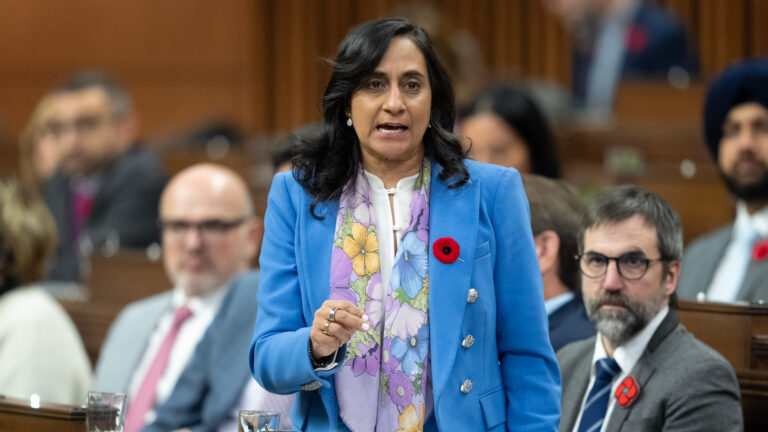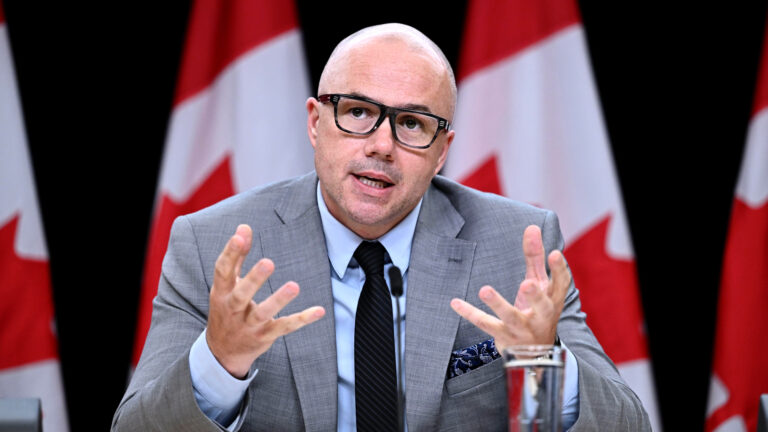When federal public servants were ordered back to the office three days a week last September, a hybrid model was adopted with the goal of enhancing collaboration and fostering a strong workplace culture. But that has not been the result across the board. Employees have expressed frustration. Some have refused to comply.
Many have turned to social media to voice their discontent. A common argument is that a new tech-savvy generation of workers can get the same, if not more, work done from the comfort of their own homes.
Indeed, the physical workplace for many departments has changed since before the pandemic. Office space has been reduced by budget cuts. Teams are sometimes separated by a shortage of desks, forced to meet via virtual calls anyway.
Yet, airing grievances online is an added point of contention for the Treasury Board Secretariat (TBS), which manages the return-to-office (RTO) policy. It says the posts are a breach of the public service’s values and ethics code.
The growing gulf between employees and employer will spell long-term trouble if it’s not handled properly.
Continuing with rigid RTO directives could lead to higher attrition and hurt productivity and service delivery, particularly in departments with younger workers, who expect flexibility and digital connectivity. Restricting the ability to voice workplace concerns – especially online – could foster fear, disengagement and distrust in leadership.
These are significant risks for the sustainability of the public-service culture.
TBS should move to a modular RTO strategy that will be flexible enough to balance ethical concerns, workforce needs and operational challenges.
Two main disconnects
TBS needs to reconcile two key tensions. The first is a disconnect between what the RTO mandate demands of public servants and what they feel is needed to provide quality service. The second is public servants’ right to free speech on social media versus the professional norm of neutrality in Canadian government culture.
Efforts to restrict social-media discussion about RTO directives aim to uphold a neutral public service. But suppressing open discussion on policies directly impacting employees undermines transparency and prevents employees from discussing rules that shape their work and lives.
Social media has blurred personal and professional boundaries, making it crucial to clarify expectations and anticipate implications of applying dated models to an increasingly digital world.
A modular RTO approach
A modular strategy would move in three phases to maintain service quality while accommodating the evolving expectations of the modern public-service workforce.
In phase one, a buddy system would be created to facilitate a smooth transition back to in-office work. New employees would be paired with colleagues who worked in the office before the pandemic or who have relevant expertise.
Simultaneously, managers and office leaders would develop concise key contact lists to provide employees with essential information about government and community actors in the local and office context, helping them acclimate more effectively.
Phase two would call for a comprehensive assessment of office space capacity, occupancy, and quality to inform decisions on potential exceptions to full RTO, prioritizing remote work where appropriate to optimize costs. This phase would also include evaluating and modernizing IT infrastructure in both central and regional offices to improve collaboration and enhance the efficiency of remote and in-person work. Investing in upgrades would help departments ensure seamless service delivery.
Phase three would focus on renovating identified office spaces to promote collaboration and minimize disruptions, maximizing the benefits of in-office work. Concurrently, downsizing should be paused until assessments are complete, preventing the premature loss of office space that may be necessary even after renovations. If additional space is required, renewing leases on relevant properties could maintain operational continuity.
Building an ethical workplace in action
For a focused approach to social media and RTO policies, the strategy should be three-pronged.
The first step is education, clarity and prevention. Update social media training modules to account for the new directives. Enable IT infrastructure to restrict access to social media on government devices unless work-related. This would reduce misuse while minimizing the political and fiscal costs of invasive monitoring.
Second, departments should establish working groups to collect employee feedback through regularly scheduled town halls and walk-in sessions. This information could be organized and presented at management meetings to promote ongoing feedback on RTO policies and other workplace concerns. This would provide a structured and constructive outlet for employee concerns.
Finally, revise department ethics codes to protect non-partisan public discussions about workplace policies. This would enhance transparency and trust by acknowledging government employees as workers who should be able to express concerns about their workplace.
These measures collectively promote accountability while safeguarding free expression and the impartial character of the public service. Together, they would create an ethical, productive workplace by balancing oversight with employee well-being. The social media restrictions emphasize education and dialogue over punitive measures and focus on practical restrictions that minimize oversight.
These solutions would help departments uphold ethical standards, improve morale, and maintain effective service delivery.
The future of an ethical federal workplace
The federal public service continues to evolve post-pandemic. The deep tensions around RTO directives underscore the need for a thoughtful, ethical approach. The federal government can be a leader in modern governance by setting clear standards on RTO and public expression grounded in strong ethics, service excellence, and collaboration.
At its core, an ethical federal workplace is one where open communication, clear directives, and operational support work in tandem to foster trust and integrity.
Our plan builds on these pillars by prioritizing structured employee feedback, revising social media guidelines to respect professional obligations and individual rights, and addressing the logistical realities of in-person work.
These strategies are not only practical, they reinforce democratic integrity and accountability, responsible stewardship of resources, and a renewed commitment to excellence in public service. Together, they create the foundation for a modern, values-driven public sector where employee morale is strengthened and service to Canadians is elevated.
The options we propose aim to mitigate some of the negative effects of the inherent contradictions between RTO directives and the mandate to downsize office space. Taken individually, they would still require more flexibility around remote work to achieve an ethical workplace and they might not be enough to fully resolve ethical dilemmas around public servants’ use of social media.
But taking all three RTO options and all three social media options together would create the conditions for RTO in an ethical workplace culture where employees feel supported and their concerns are meaningfully considered.
An ethical federal workplace is responsive, resilient, and people-centred. Through our modular, comprehensive, phased implementation strategy, we envision a future where directives are not only enforceable but embraced — creating a workplace where employees are better equipped to support Canadians into the 21st century and beyond.
Editor’s note: The recommendations in this article come from the gold medal team in this year’s National Annual Public Administration Case Competition, organized by the Canadian Association of Programs in Public Administration (CAPPA) and the Institute of Public Administration of Canada (IPAC). The authors are graduate students at Concordia University, who competed against teams at 13 other graduate schools to generate policy solutions for a timely public policy issue. The Institute for Research on Public Policy, the publisher of Policy Options, is a sponsor of the competition, which has been held since 2012.
















